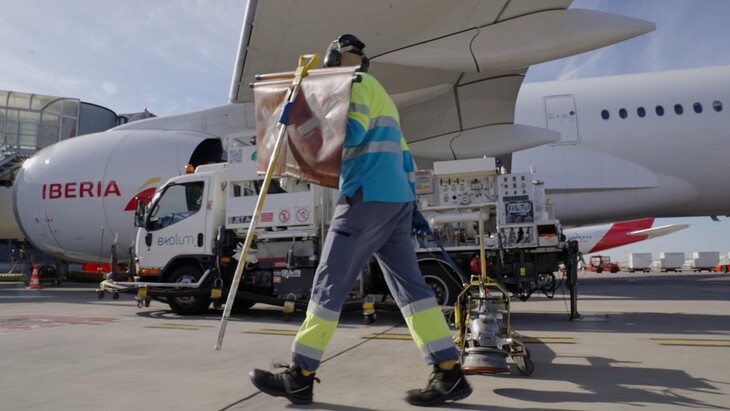
The launch in Spain of a new sustainable aviation fuel production industry represents a great opportunity to generate wealth and create new jobs.
The decarbonisation of Spanish aviation will require five million tonnes of SAF per year in 2050. According to a study by PwC for Iberia and Vueling, with between 30 and 40 production plants distributed throughout the country, Spain would be able to cover all its national demand. Given that the country’s production potential far exceeds local demand, with the installation of more plants large volumes of SAF could be exported to the international market.
The impact on GDP of the construction and commissioning of these thirty-two production plants would be €56,000 million until 2050, as well as 270,000 new jobs.
Teresa Parejo, Iberia's Head of Sustainability, explains that “Spain has the opportunity to become a major producer of SAF. It has everything necessary. In the first place, an enormous amount of the forestry, agricultural and livestock waste products that are used to produce biological SAF. And, furthermore, Spain is on its way to leading the production of green hydrogen, which, among other things, will be used to produce synthetic SAF.”
For Franc Sanmartí, Head of Sustainability at Vueling, "Sustainable aviation fuel is essential to advance in the decarbonisation of air transport. It is already a reality and can be used in current aircraft." However, it is necessary to increase its production to satisfy the demand of the industry and here "we have a great opportunity to lead the production of SAF at a European level, although it requires a collective effort from all agents to promote its production." According to the study, it will be necessary to invest around €22,000 million until 2050 for the development of all the plants.
At present, SAF production is low compared to the demand for aviation fuel. With the current infrastructures, it would only be possible to cover 0.05% of the global demand for this fuel, so it is essential to develop its production on a large scale.
A Great Opportunity for Rural areas
The production of SAF opens the door to the creation of new jobs, many of which would be located in rural areas where the largest sources of waste are used as raw materials for the production of biofuel. This would contribute to the development of what is known as “empty” Spain and to greater social and territorial cohesion.
The regions with the greatest capacity to produce organic SAF are, in this order: Andalusia, Castilla y León, Castilla La Mancha, Catalonia, Aragon, and Extremadura.
The boost to the SAF industry opens up interesting opportunities for the circular economy, as it also represents a solution to the growing problem of waste management, which has become a new business opportunity.
What Is SAF?
Sustainable aviation fuel is an alternative to fossil fuel and has emerged as  the best instrument to decarbonise the aviation sector. SAF can be organic (produced from vegetable oils, animal fats, biomass and other waste products, such as those from agriculture) or it can be synthetic (generated from CO2 capture through the use of green hydrogen).
the best instrument to decarbonise the aviation sector. SAF can be organic (produced from vegetable oils, animal fats, biomass and other waste products, such as those from agriculture) or it can be synthetic (generated from CO2 capture through the use of green hydrogen).
SAF is the immediate response to the challenge of reducing greenhouse gas emissions in short-, medium- and long-haul flights. It reduces by between 60 and 100% the CO2 emissions, when taking account its whole life cycle (from its production to its consumption).
One of the great advantages of SAF is that it can already be used -and, in fact, it is already used- because it is not necessary to modify any mechanism of the planes or of the airport infrastructures.
Our country is a leader in renewable energies and it is within reach to also become a large global producer of SAF.
Iberia and Vueling's Commitment to SAF
Iberia and Vueling have fully committed to the challenge of decarbonisation. Both airlines constantly invest in renewing their fleets to fly with less polluting aircraft. Likewise, they continually improve their operations to make them more efficient and reduce their environmental impact.
IAG, the group to which both Iberia and Vueling belong, has committed to using 10% of SAF in 2030. That amount is practically double the amount required by national and international regulations for that year, which will help boost the SAF market in Spain.
Media Resources:
VIDEO
Compacted Iberia + SAF resources: https://we.tl/t-9kDZLzHLgU
Compacted Vueling + SAF resources: https://we.tl/t-YuSEchQjbN
PHOTOGRAPHS
Iberia + SAF photos: https://we.tl/t-Pzd9pXvCZJ
Vueling + SAF photos: https://we.tl/t-27FyfCrXnJ